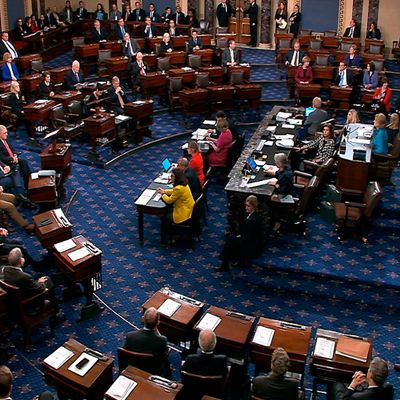
One of the big arguments going on in the 2020 Democratic presidential contest and in the broader political universe is whether abolition of the legislative filibuster is essential or even a good idea. It’s not an abstract idea to the presidential field, which has seven sitting U.S. senators and a former six-term senator. According to a Washington Post analysis, candidates committing to radical filibuster reform include Elizabeth Warren, Steve Bullock, Jay Inslee, and Seth Moulton. Michael Bennet, John Delaney, Bill de Blasio, Tim Ryan, and Joe Sestak want to keep things as they are. Six of the seven senators (Cory Booker, Kirsten Gillibrand, Kamala Harris, Amy Klobuchar, and Bernie Sanders) are “open” to killing the filibuster, but haven’t committed to doing so. And Joe Biden is listed as “unclear,” though he did say in Iowa last week that getting rid of the filibuster would be “very dangerous,” which sounds like a “no” to me, particularly given his anachronistic belief that the Senate just needs some loving care to resume its old bipartisan ways.
Assuming you don’t share Biden’s eccentric (and probably incorrect) forecast that bipartisanship is going to break out again, the key variable making the future of the filibuster a big deal is what the Senate will look like without reform. Is there a realistic chance Democrats — or even the Republicans who have a built-in advantage in the Senate thanks to their strength in smaller states — will win the 60 seats necessary to win cloture votes and overcome filibusters?
At Larry Sabato’s Crystal Ball, Hunter Brown took a look at this question, and saw little justification in the recent past or the imminent future for any optimism about a Senate super-majority:
It has been increasingly rare in recent years for a single party to command a 60-seat filibuster-proof majority in the Senate. In fact, since the end of the 1970s, it has only happened once: For a brief period from July 2009 to February 2010, Democrats held 60 seats. However, it was a very tenuous hold, only solidifying after Sen. Arlen Specter of Pennsylvania switched parties and Al Franken (D-MN) was declared the victor of a razor-thin Minnesota Senate race. Furthermore, the Democrats held many seats they likely would not have much of a chance to win today, including both seats in Arkansas, Montana, North Dakota, and West Virginia as well as a seat apiece in Alaska, Indiana, Louisiana, Missouri, and Nebraska.
Looking ahead, does either party have a reasonable path to 60 seats in the Senate? Probably not.
Brown divided the states into groups by relative degrees of partisanship, and to make a long story short, it will be tough for either party to get to 60 unless some fundamental things change.
Hypothetically, Republicans may have had a shot at 60 seats in 2018 if Hillary Clinton had won the White House — they would have needed to net eight seats, which would have been a possibility on last cycle’s Senate map with the Democrats holding the usual presidential midterm handicap — but even if they would have done it, Clinton still would have held veto power over any Republican grand legislative designs.
But if neither party can get a filibuster-proof majority, does continuation of the filibuster hurt Democrats any more than Republicans? Yes, argued Paul Waldman of the Washington Post recently:
Senate Majority Leader Mitch McConnell (R-Ky.) hasn’t left the filibuster in place because of his deep respect for the traditions and norms of the Senate. It’s because he knows that it helps Republicans much more than Democrats. If it were in the GOP’s interest to eliminate it, McConnell would have done so the day after Trump was inaugurated. But he knew that he didn’t really need it. The Republicans had a very modest legislative agenda: Cut taxes for the wealthy and corporations, which could be done through the budget reconciliation process to circumvent the filibuster, and … not much else.
As it happens, McConnell couldn’t get 50 votes for killing Obamacare, so not having the filibuster available didn’t really hurt Democrats. But if the shoe is on the other foot in 2021, the filibuster could be the biggest deal-breaker ever:
So imagine it’s 2021, a Democrat has won the presidency, and Democrats have narrowly taken control of the Senate. That president, even if it’s a relative moderate like Biden, will have campaigned on promises of sweeping change: health-care reform that dramatically expands government’s role in providing coverage, strong action on climate change, steps to address the epidemic of gun violence, infrastructure spending, an increase in the minimum wage, increasing taxes on the wealthy, moves to secure voting rights, reform to drug laws, and so much more.
And if the filibuster remains in place, McConnell can say, “Sorry. You get nothing.” The next Democratic presidency will be an abject failure, both substantively and politically.
Yes, Joe Biden foolishly believes (or professes to believe) he can charm his way around McConnell, and yes, Bernie Sanders has the equally magical belief that he can somehow create a “political revolution” that will suddenly turn red states blue. But for those living in the real world of politics, filibuster reform sure looks like a smarter bet for Democrats.






























